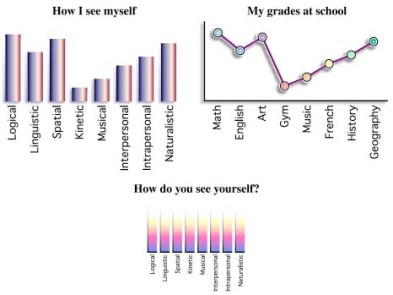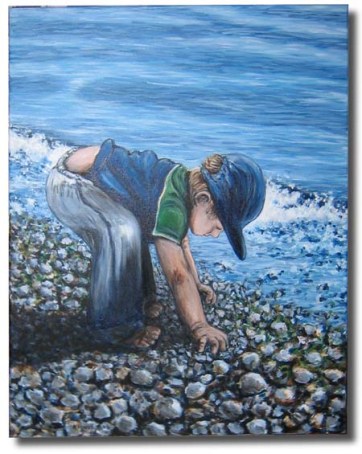People question the value of an education. I have a Bachelor of Fine Arts with a Minor in Mathematics (1985), Qualifying Status as a Customs Broker from the CICB/Revenue Canada (1990), and a DEC (College Diploma) in Special Education (1995). (Of course, I live in Québec and I didn’t have to go into exorbitant debt to do so.) I am currently an artist/writer with a day job washing dogs, getting by and living in a poor part of Montr
éal. Don’t regret any of it.

Montréal
My time at Concordia University was formative. Living in the city for the first time, meeting people from so many places studying so many things! Optimistic enthusiastic ambitious people at the lunch table (very different from a workplace lunchroom). We were going to change the world. Our professors dared us to.
During my somewhat conservative employment as a customs broker, I learned to read the business section. I had to read NAFTA, the Canada Gazette (published by Parliament), and assorted tax laws. Budget Day was must-see TV. In Mulroney’s government, Michael Wilson was Minister of Finance. Otto Jelinek was Minister of National Revenue – previously an Winter Olympian, he brought a DIY possibility to customs brokerage that upset the industry. (Taught me how to watch for economic upsets.) I learned about political and economic policies and the geography they affect. I had to input the new country codes as the USSR, Czechoslovakia, and Yugoslavia dissolved.
I have too soft a disposition to work in the field of Special Ed, but I use that knowledge in my daily life (friends, family, coworkers, bosses, landlords – everybody is special! everybody). The life and work experiences of my professors and peers still influence me. And, thank you, psychology courses!

©2003 Marion Pennell
Education need not be formal. Many astounding people are self-educated. Knowledge will allow you to travel among peoples and interact. Don’t confine yourself to all you
think you need. You have no idea how an off-hand reference to Greek mythology can resonate with the most unlikely of strangers. I often say that you should not go to school to get a job (although that is a great benefit), you should go to school to become educated so that you may have a
conversation with anyone in the world.
This is one of my favourite essays. I had to update it after running into a neuroscientist at a party. I must speak to her again. I have an interest in neuroplasticity, but that’s for another time.
When a student says, “Will I ever use this in real life?”, I want to know if they mean ‘Will I ever use
my brain in real life?’ Well I guess the answer is, it is up to you.

Didn’t go to school.
Why does a boxer skip rope? Is it to become the champion jump-rope skipper of all time? No, it is training for other reflexes that will help him at his main task. In school, we are training all the different parts of your brain.
In the computer you use most often, do you know what every file and application and extension does? Some you take for granted that they will work, and you don’t have to know how they work. Some came with your computer, and you have never opened them and don’t know how they work or even what they do. Some you have worked on and learned and explored and perhaps even mastered. Some you have a natural ability for, and an instinctual feel for that gives you a personal connection. Some don’t come naturally, but if you learn the basics, at least you can navigate through it. But isn’t it a shame if the computer lies dormant and never used, because “I don’t know how”! You may have the program already, but you have just never opened it!
It is said (Dr. Howard Gardner, 1983, professor of education at Harvard University) there are seven different kinds of intelligence (since expanded to eight).
- Logical-mathematical intelligence (“number/reasoning smart”) think great scientists
- Linguistic intelligence (“word smart”) think brilliant novelists
- Spatial intelligence (“picture smart”) think genius artists
- Bodily-Kinesthetic intelligence (“body smart”) think gifted athletes, dancers
- Musical intelligence (“music smart”) think child prodigies
- Interpersonal intelligence (“people smart”) think saintly caregivers
- Intrapersonal intelligence (“self smart”) think, just think
- Naturalist intelligence (“nature smart”) think ‘animal-person’
Each of us has a unique combination of these different intelligences. Society (and school) has tended to reward those that excel at some of these more than others. We accept that each of us is born with certain talents or abilities that we can often recognize as being firmly within one of these types of “smarts”. But that shouldn’t limit any of us from trying to achieve our own personal best within each type.  One of the reasons that human beings are born so helpless and dependent is that it takes approximately 19 years for our brain to finish forming. That is how complex an organ it is. In comparison, the baby antelope’s brain is far nearer its completed state upon birth, and therefore they are able to run and complete the basic tasks necessary for their own survival just hours after entering this world. That’s about all their brain will ever require. Eat, avoid danger.
One of the reasons that human beings are born so helpless and dependent is that it takes approximately 19 years for our brain to finish forming. That is how complex an organ it is. In comparison, the baby antelope’s brain is far nearer its completed state upon birth, and therefore they are able to run and complete the basic tasks necessary for their own survival just hours after entering this world. That’s about all their brain will ever require. Eat, avoid danger.
Obviously, no human female could carry a human to near completion, and thus babies are born with twice as many (don’t quote me on the math) bones as an adult. That is largely because the skull is formed in many overlapping platelets, as the brain is already so large that an already hard skull would kill any mother during delivery. Thus, the infamous “soft spot” on a newborn’s head. The famous “left” and “right” brain hemispheres do not take on the logic/creative functioning until approximately age six, at which time virtually all cultures send their young to school. The next major physical brain development will happen in, of course, puberty and adolescence. Only upon young adulthood (and some still make me wonder!) has the brain developed all the lobes and connections that have evolved in our species.
Some say that some gymnasts or ballerinas must begin their training while their physical bodies are still evolving or their adult body will never be able to stand “en pointe” or perform other such contortionist feats. Your brain is kind of like that. If you do not at least stimulate all the types of intelligences inherent within you while your brain is growing, it will be that much more difficult to activate them and achieve any kind of progress as an adult.
Someone once told me (no, I have no citation)that viewing an autopsy of a human brain you can physically see the difference between a multilingual person and someone who only speaks one language. Cells or neurons or synapses (again, don’t quote me on the science) have been fired and activated in a section of one brain, that lay dormant in the other. Research into neuroplasticity suggests the brain can even shift function from damaged areas into unused areas. What volume of the typical brain remains unused?
If you learn Latin, you
will have a better grasp of many languages. If you read Shakespeare or any other great works of literature you
will have a better grasp of the richness and complexity and nuance of that language. If you learn classic geometrical proofs, you
will have a better grasp of logic.

©2001 Marion Pennell
School curriculums should grow out of a core of eight disciplines which can expand grade to grade, primary school through university to include all modern fields of study. But give the brain a head start by at least activating each of the sections while young. Naturally one should study their mother tongue, both in the efficacy of its use for communication and the study of great literature in its own traditions.
Music and the performing arts, and art, as in the visual arts, form core subjects two and three. Gym or phys-ed is a must (but like all curricula should be taught so as not to punish those who are not naturally gifted).
A second language should be taught, the younger it is introduced, the better. Once a person has acquired two languages, three and four become far easier to achieve even as an adult.
Math, starting with arithmetic and logic, will progress through algebra and all the way to calculus and physics for higher education. And, yes Virginia, you will use algebra in real life, but only if you know it. If your brain can catch on to the algebraic principles, you will consciously or not, use this brain function in aspects of your daily life, from forecasting your possible investments for your retirement, right down to the weekly grocery shopping. Calculators and computers are devices that replicate the human brain processes, not replace them.
Geography widely encompasses “hard” sciences like geology, chemistry, biology and astronomy , and in modern times includes ecology and the study of the environment, in short the study of the physical or natural world. These sciences affect tradesmen (metallurgy) and industries like agriculture and manufacturing of natural resources.
History represents the “soft” sciences, or the study of man. This includes sociology, anthropology, psychology, theology and education. Archeology and paleontology together become a distinct hybrid of the History and Geography faculties. And Engineering, Law and Medicine can all be seen as progressions or combinations of these eight core disciplines.
Just as gymnastic training yields the best results if begun when young and not completely formed, mental and psychological trauma or neglect yields the worst possible damage if inflicted while still young and not completely formed. Despite their desire for adult rights and “pleasures”, adolescents should still be encouraged to refrain from experimenting as much as possible. As Chef on South Park says, “There’s a time and a place for sex and drugs, and that place is college!”
Any damage inflicted on a still developing body, brain and psyche will hamper adult development and achievement. If you wait until you are an adult (remember: brain finally complete around age 19) to make adult decisions, they will be intelligent decisions. Your frontal lobes will be intact, the logic circuits will still work, the corpus callosum will transmit between logic (left) and emotion (right) in appropriate ways, the neurons will still be firing.
Will you be a success? How do you define success? If you are achieving to the best of your abilities, if you are not afraid to stretch into areas other than your expertise, if you live a full and varied life…. well, you tell me.
What if society doesn’t monetarily reward you at what you are good at? What if a professional basketball player makes more money than a high school teacher? What are you going to be?
When you vote, are you going to understand the issues? When you hand your finances over to an accountant, are you going to know enough math to know if he is cheating you? When you tuck a child into bed, are you able to tell them a story? Sing them a song?
The generation that is in school today will be the leaders of tomorrow. I want each child today to develop
all their capacities and talents to the absolute best of their abilities. I want the adults of tomorrow to be able to think and reason* for themselves, to be able to utilize common sense* and draw upon memory*, to be able to make the leap to imagination* and intuition*, and above all to take into consideration the ethics* of what is involved.
* John Ralston Saul, On Equilibrium, 2001
So, the long and the short of it, will you ever use this in real life? I certainly hope so!

©2006 Marion Pennell
 One of the reasons that human beings are born so helpless and dependent is that it takes approximately 19 years for our brain to finish forming. That is how complex an organ it is. In comparison, the baby antelope’s brain is far nearer its completed state upon birth, and therefore they are able to run and complete the basic tasks necessary for their own survival just hours after entering this world. That’s about all their brain will ever require. Eat, avoid danger.
One of the reasons that human beings are born so helpless and dependent is that it takes approximately 19 years for our brain to finish forming. That is how complex an organ it is. In comparison, the baby antelope’s brain is far nearer its completed state upon birth, and therefore they are able to run and complete the basic tasks necessary for their own survival just hours after entering this world. That’s about all their brain will ever require. Eat, avoid danger.



